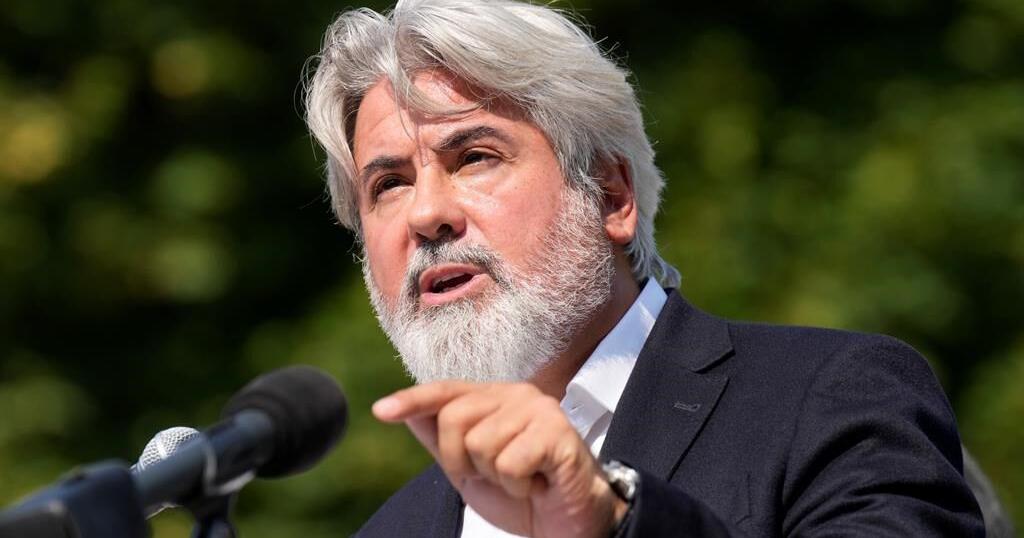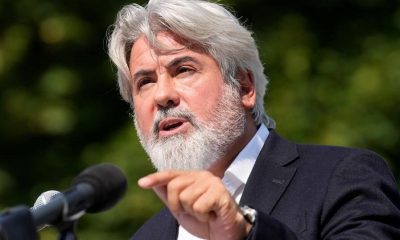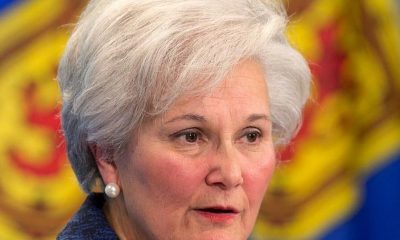The eyes of the nation are focused on the crisis playing out in Washington, and rightly so — in the span of less than a week, the capital was shaken by a violent attack on the nation’s legislative branch of government and is now braced for a likely second impeachment of the sitting president in his waning hours in the White House.
But let’s take a step back and examine this crisis moment in American democracy through snapshots here in California, from a few geographic and historical points far away from the U.S. Capitol building.
What you’ll find raises the question: How will this deeply divided country put itself back together?
From Shasta and Schwarzenegger
My colleague Hailey Branson-Potts is perhaps the most thoughtful and eloquent of staff writers at The Times when it comes to chronicling California’s rural communities. Her latest dispatch, from Shasta County, offers a glimpse of the lengths some Californians seem prepared to go to in order to reclaim what they feel they’ve lost.
“We have to make politicians scared again,” said Carlos Zapata, a resident who attended a tense meeting of county supervisors last week. “If politicians do not fear the people they govern, that relationship is broken.”
Others with whom Branson-Potts spoke echoed those thoughts and more — her story provides an important window into the anger and the call for action among those who seem to see the pandemic and the election through the same political lens.
“This is by far the worst it’s been,” Supervisor Leonard Moty said. “They politicized the virus. The pandemic. You saw a culmination of it by a president who incited a whole group of people to march to the Capitol and do bad things. I think we have a number of people in this county who follow his voice. Who knows what they will do?”
A different but no less dire warning was issued Sunday by the last Republican governor of California, Arnold Schwarzenegger. While he has hardly been silent about his opposition to President Trump, the video he posted on social media was deeply personal, including a harrowing tale of his father and other Austrian men who became members of the Nazi Party. Schwarzenegger likened the violent mob that attacked the Capitol last week to the horrific events of Kristallnacht, the murderous rampage by Nazis over two nights in November 1938.
“I grew up in the ruins of a country that suffered the loss of its democracy,” Schwarzenegger said. “Growing up, I was surrounded by broken men drinking away their guilt over their participation in the most evil regime in history. Not all of them were rabid anti-Semites or Nazis. Many just went along, step by step, down the road.”
The former GOP governor, whose second term in office was dominated by a steadily growing gap with his party’s sharply conservative base, said he did not believe America was on the same path. Yet.
“President Trump sought to overturn the results of an election and of a fair election. He sought a coup by misleading people with lies. My father and our neighbors were misled also with lies, and I know where such lies lead.”
A second impeachment
There are no hard and fast rules about what constitutes an impeachable offense under the U.S. Constitution. The Republican leader of the House in 1970, Gerald Ford, famously put it this way: “An impeachable offense is whatever a majority of the House of Representatives considers it to be at a given moment in history.”
All signs indicate that the House will consider an article of impeachment against Trump as soon as this week for what Democrats and a smattering of Republicans believe is his role in sparking the violent mob that attacked Congress.
“Next we will proceed with bringing impeachment legislation to the floor,” House Speaker Nancy Pelosi said in a letter to her colleagues, giving Vice President Mike Pence 24 hours to respond. “In protecting our Constitution and our democracy, we will act with urgency, because this president represents an imminent threat to both.”
Sen. Patrick J. Toomey (R-Pa.) said Saturday that he believes the president committed an impeachable offense but didn’t say whether the Senate should convict Trump and remove him from office before President-elect Joe Biden takes the oath Jan. 20.
Biden sidestepped the issue when asked about it by a reporter last week, choosing instead to reaffirm his belief that Trump is “unfit” for the job. So, too, did many former top U.S. security officials when asked by The Times whether the president is a threat to the nation’s security.
“What would this president do over the next days if it happens again — if a domestic or foreign enemy attacks any element of this country?” asked Tom Bossert, Trump’s former homeland security advisor, who left in 2018. “I don’t get the impression he would do a damn thing, and I find that to be alarming.”
Enjoying this newsletter? Consider subscribing to the Los Angeles Times
Your support helps us deliver the news that matters most. Become a subscriber.
The social media shutdown
For a presidency largely conducted through social media platforms, the last few days have been … quiet. Not that President Trump doesn’t have ways to communicate with the nation — press releases, press conferences, media interviews come to mind — but he has chosen to use none of those options in the days since Twitter permanently suspended his account and wiped out its reach to some 88 million followers.
“Silicon Valley has ended the Twitter presidency,” is how Times staff writers Eli Stokols, Andrea Chang and Suhauna Hussain put it in their story Friday afternoon.
The Facebook banishment has been described as “indefinite” by the company’s leadership. Other social media companies have taken similar actions to limit Trump’s use of their services. Whether the president waits out his suspension or seeks to embrace some conservative-leaning platforms remains to be seen.
In the meantime, archives of the president’s prodigious Twitter habit are a popular online item. The Times took a look at the history of his tweets about California.
National lightning round
— Despite ample warnings, the U.S. Capitol Police did not bolster staffing Wednesday and made no preparations for the possibility that the planned protests could escalate into violent riots, according to several people briefed on law enforcement’s response.
— Congressional leaders wanting answers about the actions of the U.S. Capitol Police in last week’s melee might want to remember that they are the ones who have ensured that the agency’s procedures and actions were kept under wraps for decades.
— A Republican state legislator from West Virginia faces federal charges after he livestreamed himself entering the U.S. Capitol with rioters.
— In the final days of his presidency, Trump may have exposed himself to criminal prosecution after he leaves the White House.
— The president left a lot of clues over the years that he wouldn’t go quietly when his time in office came to an end.
— House lawmakers may have been exposed to someone who tested positive for the coronavirus while they sheltered at an undisclosed location during the Capitol siege.
— GOP members of Congress who voted against certifying Biden’s victory, even after a mob broke into the Capitol, are rebuked in their districts.
— Before they take office, elected officials swear to uphold the U.S. Constitution. But what happens when they are accused of doing the opposite?
— American diplomats have drafted cables condemning Trump’s incitement of the Capitol riot and calling for administration officials to support invoking the 25th Amendment.
Newsom to Legislature: Act fast on schools, stimulus
There were two separate California budget efforts unveiled last week by Gov. Gavin Newsom: one that lays out his proposals for state spending in the fiscal year that begins in July and one for immediate action by the Legislature this month.
Let’s take the most pressing issues first. Newsom wants legislators to sign off on $5 billion in immediate actions: $2 billion for elementary schools that put together campus reopening plans once COVID-19 conditions allow (and those that have remained open) and a $3-billion plan for direct relief to Californians and businesses — most of which would be spent in the form of $600 checks for about 4 million of the state’s lowest-income residents.
That would be followed by action in the spring on another $6.5 billion in pandemic response efforts. Education programs make up the bulk of the proposal ($4.6 billion) and focus on students who have fallen behind as the result of remote learning. Job assistance and workforce training are also included in the package; so, too, are dollars to continue the purchase of hotels for homeless housing and a boost for zero-emission vehicle incentives for those who can’t otherwise afford them.
Newsom’s budget for the coming year, a $227.2-billion spending plan that he submitted Friday, is a testament to the remarkable staying power of professional, upper-income jobs during the pandemic. Last year’s budget assumed a historic collapse of tax revenue that largely didn’t come to pass, especially for the higher-income earners on which California relies to fund its government services.
“We’ve got a lot of work to do to help small, medium-size businesses, but folks at the top [are] doing pretty damn well,” Newsom told reporters on Friday.
Today’s essential California politics
— Newsom said the state will vaccinate 1 million more residents by Jan. 17, a goal announced amid the lagging vaccination rollout and surging cases of COVID-19.
— State Senate Minority Leader Shannon Grove (R-Bakersfield) posted, then quickly deleted, a tweet Wednesday accusing the mob that overran the U.S. Capitol of being led by the leftist, anti-fascist movement known as antifa and not by supporters of President Trump.
— Ten months into a COVID-19 pandemic that has put many out of work, the state unemployment agency has suspended payments on 1.4 million benefit claims, angering jobless Californians as it attempts to rein in rampant fraud.
— The former chair of the Federal Election Commission filed a complaint against a major contributor to the campaign to recall Newsom, alleging that a “shell company” was being used to hide the identities of its donors.
Stay in touch
Keep up with breaking news on our Politics page. And are you following us on Twitter at @latimespolitics?
Did someone forward you this? Sign up here to get Essential Politics in your inbox.
Until next time, send your comments, suggestions and news tips to politics@latimes.com.
































